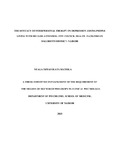| dc.description.abstract | Introduction and Background
The commonest mental health disorder diagnosed in level two and three Primary Health Care settings in people living with Human Immune Virus and Acquired Immune Deficiency Syndrome is major depressive disorder. Psychotherapies which have been evaluated and found to be effective mostly in the western setting in treatment for major depressive disorders in HIV /AIDS include Interpersonal Therapy. In this study the researcher adopted IPT intervention to the comprehensive management of HIV in Kenya
Objectives
To carry out an interventional study testing the effectiveness of Interpersonal therapy on depression and suicidality among people living with HIV/AIDS attending City council health facilities in Dagoretti district.
Specific Objectives
1 To assess depression and suicidality among people living with HIV/AIDS
2 To locally adapt IPT to the HIV situation in Kenya
3 To assess the efficacy of IPT on major depressive disorder and suicidality in HIV
positive patients
4 To assess the efficacy of IPT on ART adherence and HIV disease progression
(CD4 counts)
Study Design, Subjects and Setting
This was an interventional study that constituted an experimental group and a control group, in four City County Health facilities in Dagorretti District of Nairobi (Woodley, Ngong Road, Waithaka and Riruta) among people living with HIV/AIDS.
Sample size:
A sample of 305 HIV positive people with a CD4 count <500 cells per milliliter of blood aged 18-55 + years old (grouped according to WHO policy) were recruited. Waithaka health facility had experimental group (N=152) the control group was Ngong RD (N=52), Woodley (N=50) and Riruta health facility (N=51)
Ethical Considerations
Ethics approval was obtained from the University of Nairobi/KNH research and Ethics Committee. Participants were explained on the nature of the study, confidentiality, anonymity, voluntary participation, inconveniences at times and the right to withdraw any time in the cause of the study without loss of benefits
Instruments
Self-administered questionnaires were used which included;
(i) Social Demographic questionnaire
(ii) Becks Depression inventory (BDI-II)
(iii) Becks suicidality scale (BSS)
These instruments are well understood by the researcher.
Intervention
Two assessments were carried out using similar instruments at an interval of 3 months among the study groups. Experimental group was given 16 sessions of group therapy in form of discussions, divided into three phases. The phases followed the four basic interpersonal problem areas of IPT which are unresolved grief, role transitions, interpersonal role disputes and interpersonal deficits. The IPT was given to the participants as psychoeducation on depression, suicidality and HIV relatedness emotional symptoms. Each psychoeducation intervention totaled 12 hours of three sessions per phase. It required the therapist to be observant as each member of the groups shared their problems in group discussions, to notice the emotional reactions like crying, verbalizing feelings of sadness and hopelessness. This helped to identify the psychological symptoms in the
patients and the interpersonal context in which it presented. The therapist addressed the problems in the present, and acknowledged the exacerbating role of long standing interpersonal deficits which were the focus of treatment. This was done by use of discussion, reflections, support, interpretation and participant‟s encouragement. The therapist tried to disrupt the clients vicious cycle of self -defeating, interpersonal interactions and relevant issues having to do with the current relationships in small group discussions of 8-10 participants
Data Management and Analysis
Quantitative data was double entered into a computer data base using MS-Access application by two separate groups of data entry clerks. Data was analyzed using (IBM SPSS) version 20.0 utilizing descriptive and inferential statistics in form of tables, figures, linear and narratives.
Results:
Post intervention assessment indicated that in comparison to the control group, the intervention group had a faster reduction in depression symptoms scores. Mean Beck score revealed no significant difference at the baseline 32.3% (17.3vs15.0;p=0.071) After six months of follow up with intervention in experimental groups and treatment wait list for control group mean Beck score was significantly high in control compared to experimental 29.6% (24.2 vs. 5.4;p<0.001
Conclusion: The intervention was effective, in reducing major depressive and suicide symptoms in people living with HIV/AIDS. | en_US |
| dc.description.department | a
Department of Psychiatry, University of Nairobi, ; bDepartment of Mental Health, School of Medicine,
Moi University, Eldoret, Kenya | |



